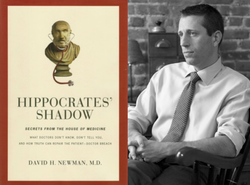
The main idea that I got out of this book is in regards to a big part of my practice (and something the care providers around me have taught me) which is intention. The intent of whatever you do, or make, or give can be where the healing is.
I choose to elaborate on ideas he raised that matter to me as a massage therapist and herbalist (though of course, issues like how ineffective CPR is for the majority of people is important to me too) but I recommend reading the book in full
BACK PAIN
As someone who sees a lot of clients for back pain (and experience it myself) this bit hits close to home. 70% of humans experience severe back pain sometime in their lives. However, what causes back pain is a mystery to modern science. The most common problems physicians see on MRI's that may contribute to back pain - herniated, ruptured, and bulging disks - also occur in the same frequency as people who are not experiencing pain. Perhaps the location of the injury is important? Science hasn't even gotten that far - they simply see an injury, see that you have back pain, and schedule surgery. Surgery on these injuries only has a 50% success rate. What's a skeptic to do, but just do yoga, get massage, take anti-inflammatory herbs, nervines, and anti-spasmodics, and talk with a osteopath or chiropractor?
KNUCKLE CRACKING
Apparently, modern medicine has no idea what makes knuckles crack. No, I'm not joking, there are various theories, but nothing is proven. Despite numerous studies and meticulous data-collection, everyone has a different theory. This will be my new question to ask a care provider, to see if they make something up ..
COUGH
Both over the counter and prescription cough medicines "none of [them] works any better than a placebo, and none ever has." Interesting .. this is starting to allude to the fact that a placebo must have other factors at play. When I give people wildcherry bark with honey and lemon, is it a placebo? Maybe, but there's something else in the medicine that can't be explained.
MIGRAINES
Common prescription medicines for migraines don't work very well (for most people). What's a better option? (Note: this is a sideline, David Newman does not recommend herbs here) = Give them antiemetics (anti-nausea) medicine (try ginger tea or caps at the first sign of a headache) for acute migraines, plus pain medication. Apparently when you get rid of the nausea associated with migraines, it calms the body down enough to dull the pain.
ANTIBIOTICS
Often cause more harm than good. Even when a bateria is present and patients are not mis-diagnosed or demand antibiotics even though their doctor tells them they don't need them. The amount of yeast infections, diarrea, severe allergies (1 in 400 antibiotic takers have an allergy) and other unnecessary side effects for unnecessary prescriptions causes Dr. Newman to devote an entire chapter on antibiotics. Herbal alternatives? Goldenseal, echinacea, garlic, honey and more herbs can help. Remember you can always take antibiotics later.
PLACEBO & INTENTION
Often, placebo's work. Often better than their "active" counterparts. However, Dr. Newman goes a little deeper and describes the idea of a "meaning response" - we assign meaning to pills, treatments, diagnosis and rituals of healing. This is the reason why acupuncture (or any procedure) is less likely to work for you if you don't believe in it. A quote from the book that is long but important, and pissed me off a bit too =
"It's been argued that some fields of alternative medicine depend largely - perhaps even entirely - on meaning responses. If so, are we to conclude that these methods don't heal? Speak to migraine sufferers who see an acupuncturist for their headaches. They neither know or care that a recent trial found acupuncture for migraines 'no better than a placebo.' In the trial, while acupuncture was not better than a placebo procedure, both were far better than being in the group assigned to the 'waiting list.' where patients never had any contact with acupuncturist. Many migrane sufferers, and many acupuncturists, have found that the headaches are reduced by acupuncture, and they believe in it strongly; therefore, they're right. Whether it is the ritual of administering the procedure or the biological impact of the acupuncture that provides relief is in many ways immaterial to the patients... for patients, speaking to the [practitioner] about what [ailment] is, where it comes from, and what to expect is a meaningful and healing act .. Though Hippocrates may not have known it, the meaning response was likely the core of his practice, and by all accounts his patients loved and revered him. He was a master healer."
Perhaps it took me a while to realize this (as a beginning healer) but what I actually massage or herbalize my client with, doesn't actually matter as much as I thought it did. What seems to matter more is the relationship, the giving of hope, the act of listening and holding space for their pain. I might devise a stellar treatment plan, but without the "meaning response" my remedies are much less likely to be effective for my clients.
Check the book out! Brooklyn Public Library has it, or you can purchase from Bluestockings Bookstore.

 RSS Feed
RSS Feed